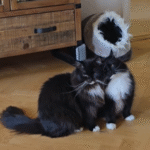Have you ever watched your cat dart under the bed when guests arrive, or noticed them slinking silently away during a family gathering? Many cat lovers find themselves wondering: do our feline friends actually feel emotionally overwhelmed by the hustle and bustle of a busy home? The answer might surprise you. Cats, known for their mysterious and sometimes aloof personalities, are far more sensitive to their environment than we often realize. Let’s take a closer look into how the chaos of a lively household can impact a cat’s emotional world—and what signs you should be watching for.
Understanding a Cat’s Sensitive Nature
Cats are creatures of habit and thrive on routine. Sudden changes, loud noises, or constant movement can throw off their sense of security. Unlike dogs, who may seek out attention and play even in noisy environments, cats often prefer calm and predictability. This preference comes from their instinct as both predators and prey in the wild—being alert and cautious helps them feel safe. When their home becomes unpredictable or loud, cats can easily become anxious. Small disruptions, like moving their litter box or rearranging furniture, may already unsettle them, so imagine how overwhelming a bustling household might be. Their heightened senses make every sound and movement feel amplified, adding to their stress.
Recognizing Signs of Emotional Overwhelm
Some signs that your cat might be overwhelmed are more obvious than others. Hiding is a classic signal—many cats will retreat under beds, behind furniture, or into closets when things become too much. Others may become unusually vocal, meowing or yowling more than usual. You might also notice changes in their grooming habits; stressed cats sometimes over-groom or, conversely, neglect grooming altogether. Appetite can be another clue, as some cats refuse to eat when anxious, while others might overeat for comfort. Watch for signs like flattened ears, dilated pupils, or a twitching tail. Understanding these subtle clues is crucial to helping your cat feel safe and comforted.
The Impact of Noise and Activity Levels
A noisy home, filled with children, visitors, or even loud appliances, can be a real challenge for cats. Their acute sense of hearing picks up sounds we barely notice, and what seems like normal background noise to us can be overwhelming for them. Constant footsteps, doors slamming, or music blaring can trigger a cat’s fight-or-flight response. In busy households, it’s common for cats to seek out high perches or hidden nooks where the noise feels more distant. Even celebrations and parties, while fun for humans, can leave a cat feeling stressed and agitated. The key takeaway is that cats need quiet spaces to retreat and recover from sensory overload.
How Cats Express Stress and Anxiety
Stress in cats doesn’t always look the way we expect. Sometimes, it shows up as aggression or irritability—your normally sweet cat might lash out or swat unexpectedly. Other times, stress manifests as withdrawal, where your cat becomes less social and avoids interaction altogether. Some cats may urinate outside the litter box or develop digestive issues as a physical response to emotional overload. You might notice your cat pacing, excessive scratching, or even excessive sleeping as a way to escape overwhelming feelings. Each cat has a unique way of coping, but all these behaviors are signs that your feline friend is struggling with their environment.
The Importance of Safe Spaces
Every cat needs a sanctuary, especially in a busy home. This could be a quiet room, a cozy cave bed, or a high shelf where they can observe without being disturbed. Safe spaces allow cats to decompress and regain their sense of control. Providing these retreats is an act of love, showing your cat that their comfort matters. Simple additions like a covered cat bed or access to a spare bedroom can make a world of difference. Some families even set up “cat-only” zones that humans and other pets respect. This helps reinforce your cat’s sense of safety and reduces the likelihood of stress-related behaviors.
Introducing Changes Gradually
When change is unavoidable, such as moving homes or welcoming a new family member, it’s important to help your cat adjust slowly. Sudden changes can spike anxiety, so try introducing new people, pets, or objects one at a time. Let your cat explore at their own pace, without forcing interactions. Use comforting items like their favorite blanket or a familiar toy to help ease transitions. Sometimes, pheromone diffusers or calming sprays can help lower stress levels. Your patience and gentle reassurance will go a long way in helping your cat feel secure, even when life gets hectic.
The Role of Play and Enrichment
Despite their love of peace and quiet, cats still need stimulation and engagement. In busy households, structured playtime can help channel their energy in positive ways. Interactive toys, puzzle feeders, and regular play sessions can distract from stressful events and build confidence. Enrichment also helps prevent boredom, which can add to feelings of overwhelm. Try rotating toys or creating new climbing opportunities to keep things interesting. Play boosts your cat’s mood and strengthens the bond you share, turning the chaos of a busy home into a source of joy rather than anxiety.
How to Support Your Cat in a Busy Household
Supporting your cat in a lively environment means tuning in to their needs and respecting their boundaries. Establish routines for feeding, play, and quiet time to provide predictability. Keep noise levels in check when possible, and encourage family members to be gentle and patient. If you have guests, give your cat a safe haven where they won’t be disturbed. Pay attention to their body language and adjust your approach if they seem uneasy. Sometimes, all it takes is a soft voice and a gentle pet to reassure your feline friend that they are loved and safe, no matter how hectic life gets.

Suhail Ahmed is a passionate digital professional and nature enthusiast with over 8 years of experience in content strategy, SEO, web development, and digital operations. Alongside his freelance journey, Suhail actively contributes to nature and wildlife platforms like Feline Fam, where he channels his curiosity for the Feline into engaging, educational storytelling.
With a strong background in managing digital ecosystems — from ecommerce stores and WordPress websites to social media and automation — Suhail merges technical precision with creative insight. His content reflects a rare balance: SEO-friendly yet deeply human, data-informed yet emotionally resonant.
Driven by a love for discovery and storytelling, Suhail believes in using digital platforms to amplify causes that matter — especially those protecting Earth’s biodiversity and inspiring sustainable living. Whether he’s managing online projects or crafting wildlife content, his goal remains the same: to inform, inspire, and leave a positive digital footprint.






